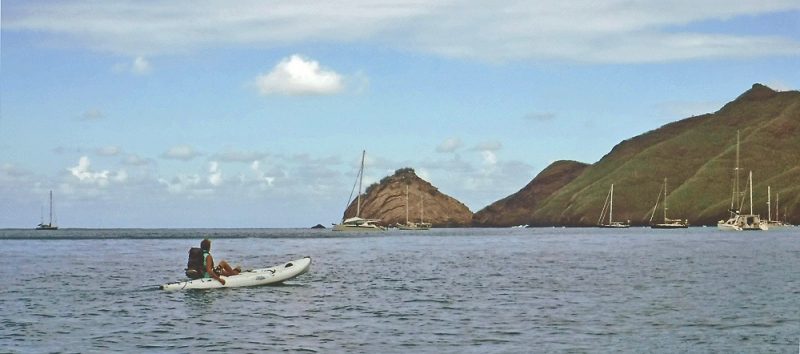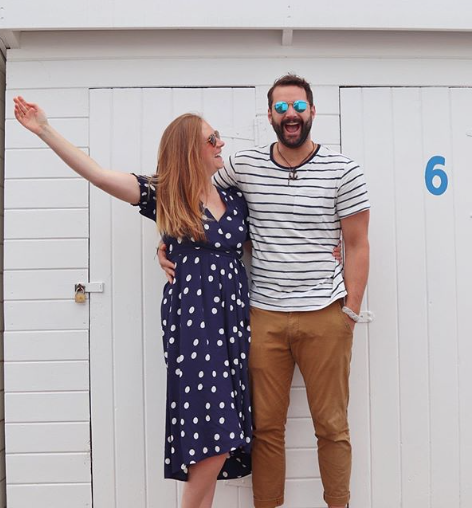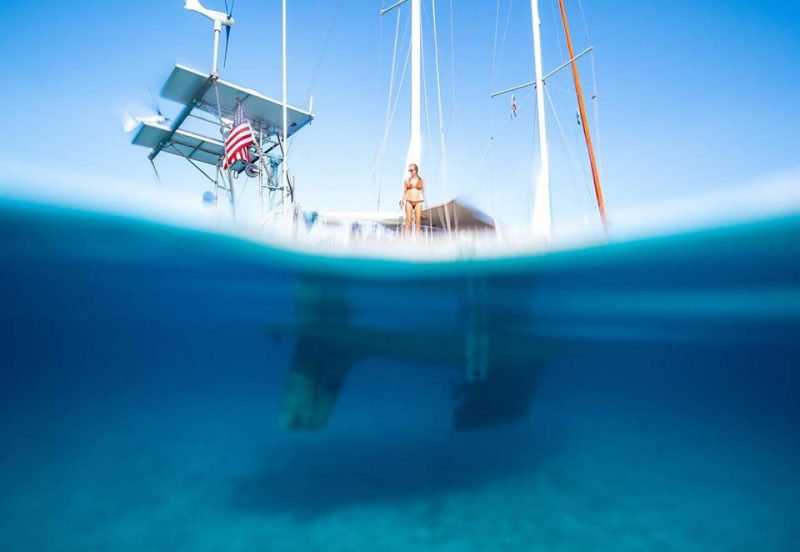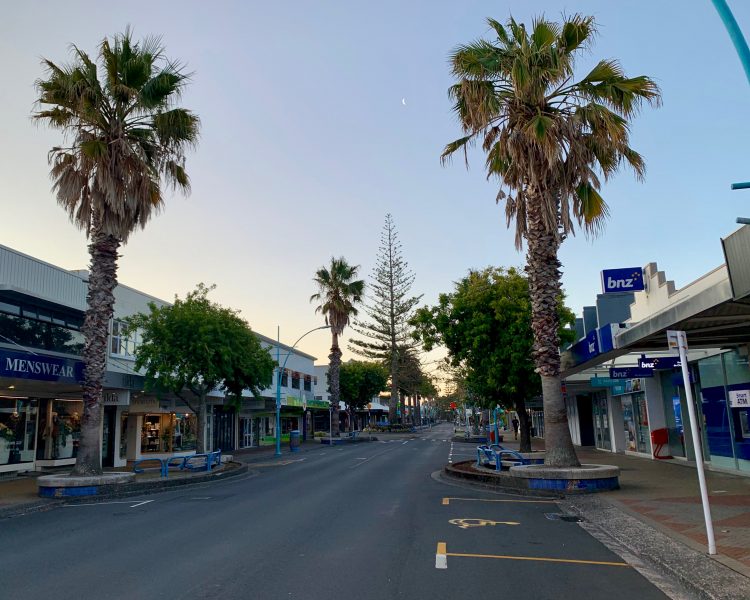
Are Sailors Stranded at Sea Seeing a Light at the End of the Tunnel?
Has the COVID-19 pandemic forced some countries to breach international maritime laws and deny sailors safe harbor? Are cruisers, who are by nature transient and who cross borders regularly, caught between a particularly unique rock and a hard place, or are they just stuck in inconvenient situations like the rest of us? And, for our final question in this lead, has the pandemic made the mainstream media discover that cruising exists?
After about three months, but what feels like three years, of reporting on the pandemic’s effects, we are starting to hear the same things — or rather, the broader context is setting in.
In this month’s Latitude, editor at large Andy Turpin shares dispatches from cruisers in the South Pacific. “Following the pivotal March 11 announcement of Tahiti’s first confirmed case of COVID-19, leaders of the French Overseas Territory quickly took unprecedented steps to combat the spread of the virus. In addition to implementing ‘lockdown’ ordinances ashore, cruise ships were denied entry to ports and anchorages, inter-island boat travel was forbidden, all international and inter-island flights were canceled, and then virtually every land-based tourist was flown home via a series of ‘repatriation flights.'”

Andy said that while sailors who had not yet departed for the South Pacific were asked to cancel their passages, “policymakers in Tahiti acknowledged that vessels that had just crossed a minimum of 3,000 miles of open ocean nonstop would need to fuel up, reprovision and make repairs, even if they weren’t allowed to freely cruise the territory’s five archipelagos as in years past.”
On May 20, French Polynesia’s president and its high commissioner jointly announced an end to almost all the restrictions that had been implemented nine weeks earlier, including inter-island travel, Andy reported.
Not long after the pandemic began, The Facebook group Stranded at Sea 2020 sprang up as a forum for boats in limbo. “Since shelter in place rules began worldwide, we’ve heard countless stories of cruisers and sailors who were en route to safer harbors as Hurricane Season 2020 is around the corner, only to be denied safe harbor. Ranging from rude to downright illegal, we’ve heard of vessels being approached by police in the middle of the night and told they had to leave. Others were allowed to fuel and receive water, but then sent along. It is frankly, quite dangerous to send a tired crew back out to sea, and breaks international safe harbor laws.”
Stranded at Sea recently shared posts saying that several Caribbean countries — such as St. Lucia, Grenada, Antigua and Barbuda — are set to open soon (or already have).
“It turns out, a lot of former Bay Area residents are stranded on their boats during the pandemic,” SF Gate wrote recently, having originally reported on Audrey and Garrett Ruhland, who were stuck on the 35-ft thisldu.

Well, cruisers are on the mainstream radar, anyway.
In mid-March, CNN ran the story Trip of a Lifetime with No End in Sight — Life on Small Boats Stuck at Sea, which featured several cruisers, including the Seattle-based YouTube juggernaut SV Delos. The 53-ft Amel Super Maramu was in the Bahamas with Brian and Karin Trautman and their newborn Sierra, who were waiting for Brady Trautman and Alex Blue to return from Lake Tahoe (we think); Delos was planning on sailing to the east coast of Canada and on to the Northwest Passage to complete a circumnavigation 10-ish years in the making.
Regarding the pandemic, Brian was quoted as saying, “I feel like we’ve been preparing for this our entire sailing career. We have months of food and fuel, and can make our own water and alcohol.” Delos had been anchored at an upopulated atoll with eight other boats for more than 80 days, according to CNN.

It might be easy to forget that “cruisers” encompasses a large group of people in a number of different circumstances, from the fortunate to the cursed. We mean this in terms of people’s individual logistics as to where they might have gotten stuck, as well as their respective financial situations.
Before YouTube stardom, the Delos crew scraped out the cruising life in the “traditional” way, by working odd jobs at various destinations. While we’re not making any assumptions about the living they make, Delos seems to have gained a certain level of cruising comfort. We’re not sure what the average CNN reader assumes about sailors, but it’s fair to say that many non-sailors still look at sailing as a lifestyle of the rich rather than the working class.
During our time in New Zealand — where sailing is famously egalitarian — we met lots of blue-collar people working month-to-month to pay bills and slip fees, and to work on their boats. Everyone was taking the pandemic in stride and grateful for their health and relative security (the New Zealand government is also famous for taking care of its citizens). But people also told us that they were disappointed, frustrated and bored. “It’s the loss of choice that hurts,” said one sailor.

The most pressing of questions is, are countries breaking international maritime law by denying entry?
The United Nations Convention Law of the Sea, or UNCLOS, does not directly define “safe harbor.” UNCLOS says that ships of all states enjoy the right of innocent passage through all territorial seas. “Passage shall be continuous and expeditious. However, passage includes stopping and anchoring, but only in so far as the same are incidental to ordinary navigation or are rendered necessary by force majeure or distress or for the purpose of rendering assistance to persons, ships or aircraft in danger or distress.” (‘Force majeure’ is defined as unforeseeable circumstances that prevent someone from fulfilling a contract; colloquially, it’s an act of God.)
So the law is crystal clear, right?
Even Bay Area daysailors have found that “the rules” regarding cruising can vary widely from city to city. You might leave the dock in San Rafael following the letter of the law, only to arrive in San Francisco in violation of their social-distancing guidelines. Imagine, now, how much policies might vary from country to country. Imagine some harbormaster in a remote part of a remote country getting an email that says, “Borders are closed. Don’t allow anyone in.” That harbormaster must then make countless judgment calls as cruisers in a variety of situations shuffle to the dock.
There have been stories of sailors flouting the rules and trying their luck sailing into different countries, hoping to be allowed to stay. There have also been stories of sailors desperate for provisions or getting out of the way of bad weather. In other words, countless individuals around the world are making countless decisions based on countless different circumstances.
And that’s the broader context: It’s complicated, and difficult to pinpoint as any one particular trend. Regardless — and without making any predictions — there does seem to be a light at the end of the tunnel for stranded sailors.
If you’re out there and have a story to tell, please comment below, or email us here.
